Module 4 Unit 1 I haven't done much exercise since I got my computer.课件(共27张PPT,含内嵌音频) 外研版八年级下册
文档属性
| 名称 | Module 4 Unit 1 I haven't done much exercise since I got my computer.课件(共27张PPT,含内嵌音频) 外研版八年级下册 |
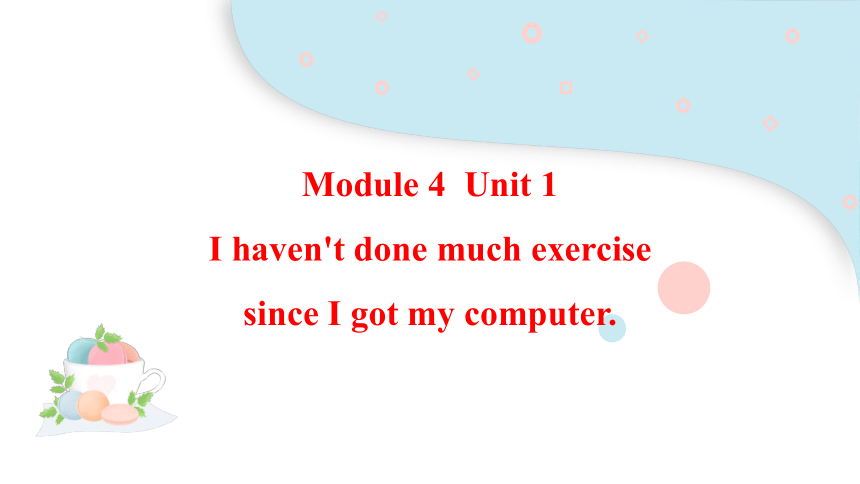
|
|
| 格式 | pptx | ||
| 文件大小 | 6.9MB | ||
| 资源类型 | 教案 | ||
| 版本资源 | 外研版 | ||
| 科目 | 英语 | ||
| 更新时间 | 2024-11-23 16:09:24 | ||
图片预览

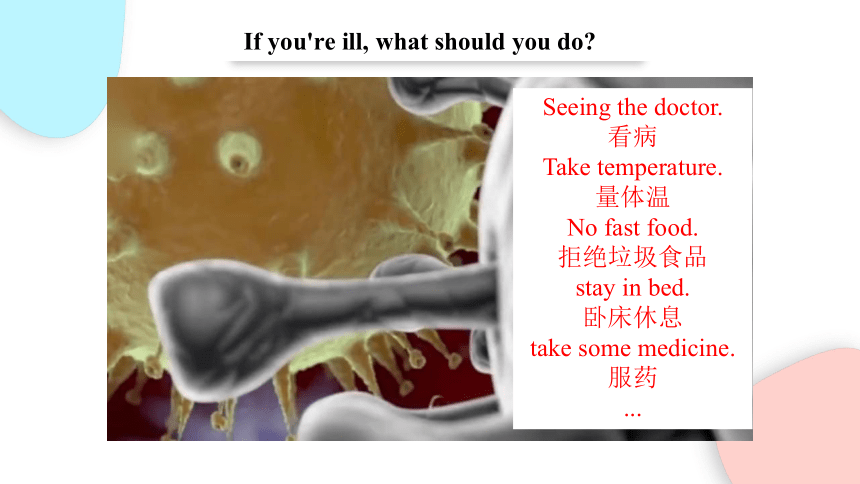
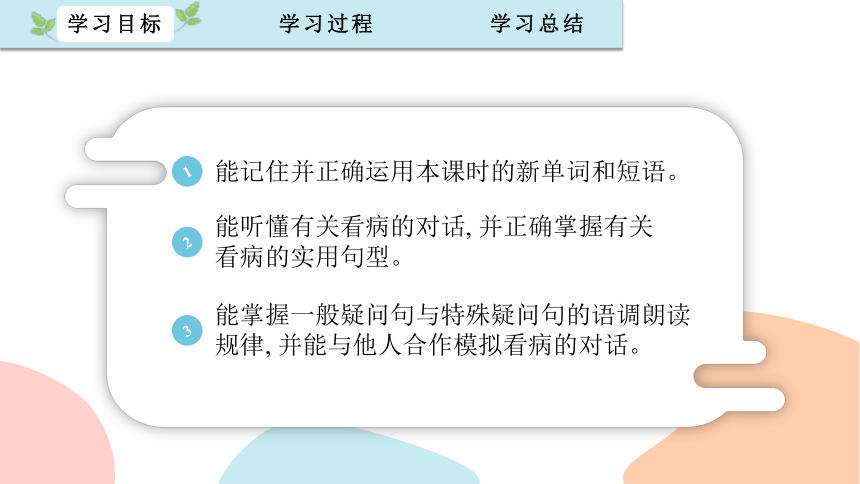
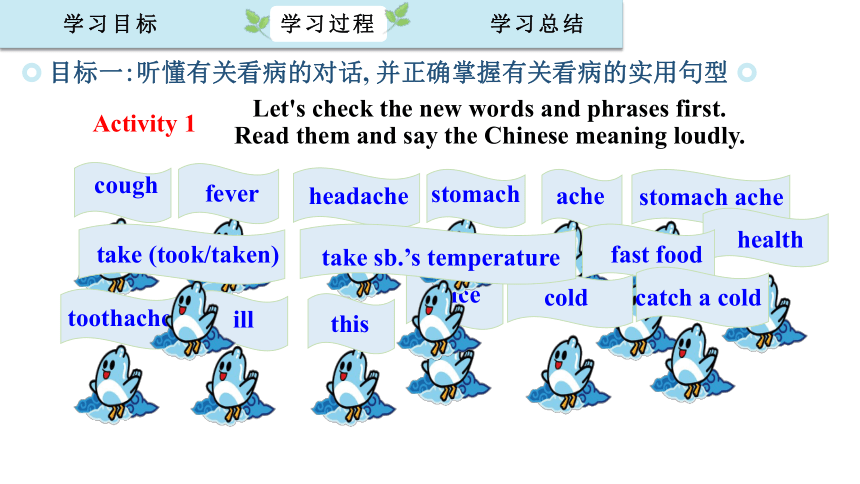
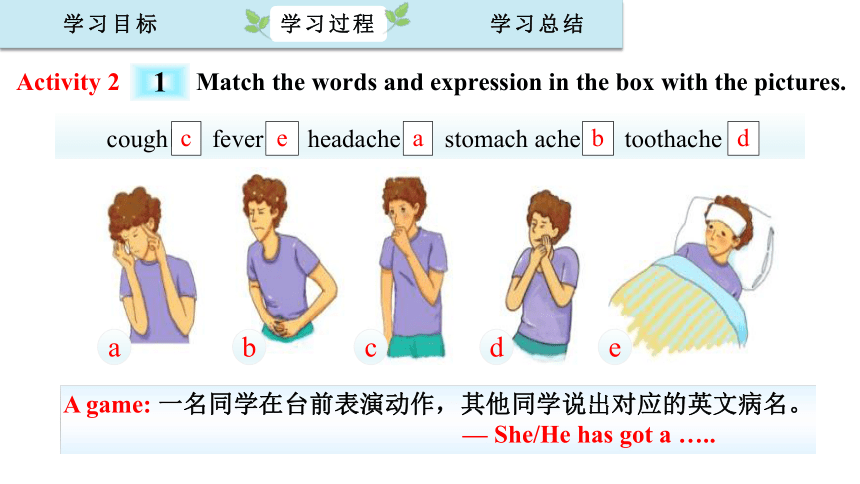

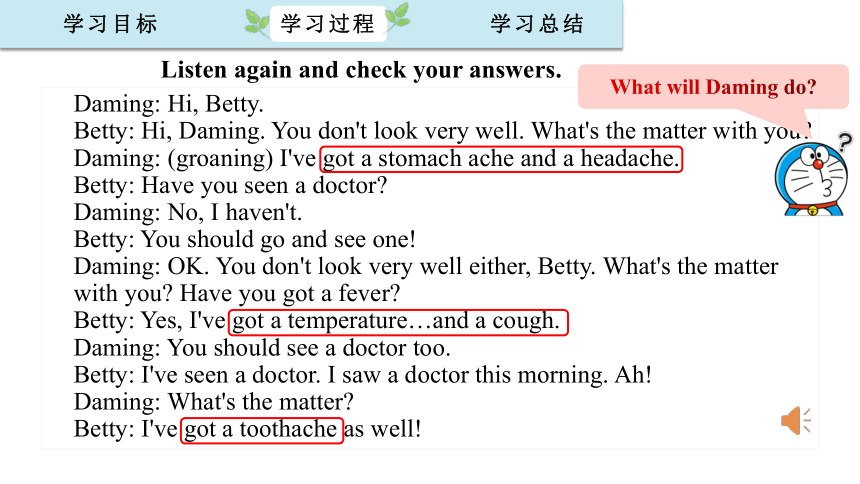
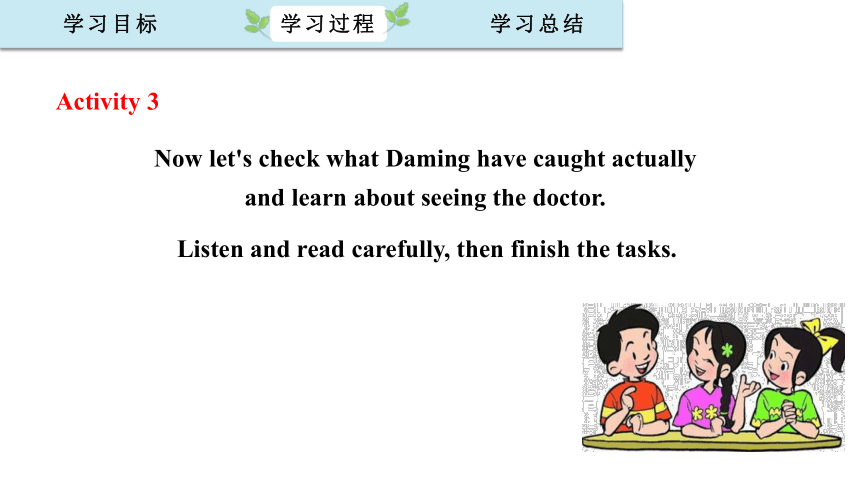
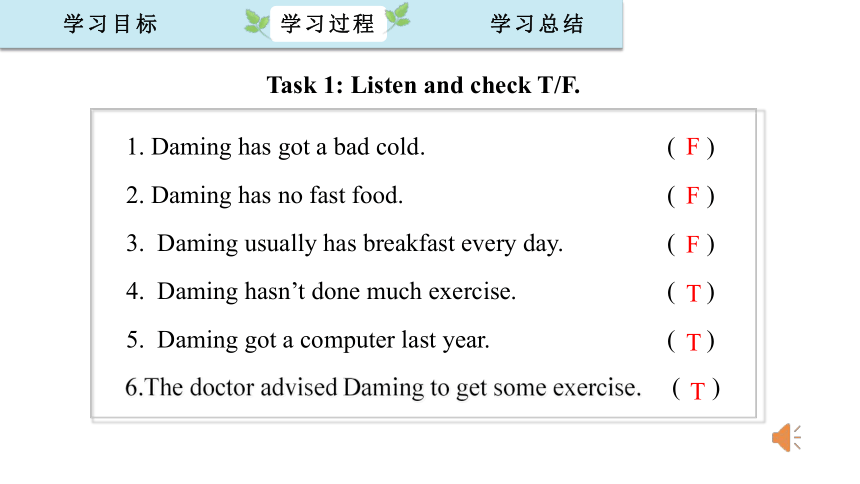
文档简介
(共27张PPT)
Module 4 Unit 1
I haven't done much exercise
since I got my computer.
Let's watch a video first.
If you're ill, what should you do
Seeing the doctor.
看病
Take temperature.
量体温
No fast food.
拒绝垃圾食品
stay in bed.
卧床休息
take some medicine.
服药
...
1
2
能记住并正确运用本课时的新单词和短语。
3
能听懂有关看病的对话, 并正确掌握有关看病的实用句型。
能掌握一般疑问句与特殊疑问句的语调朗读
规律, 并能与他人合作模拟看病的对话。
目标一:听懂有关看病的对话, 并正确掌握有关看病的实用句型
Activity 1
Let's check the new words and phrases first.
Read them and say the Chinese meaning loudly.
cough
fever
since
toothache
stomach
headache
ill
stomach ache
health
ache
fast food
cold
this
take (took/taken)
catch a cold
take sb.’s temperature
Activity 2
1
Match the words and expression in the box with the pictures.
cough□ fever□ headache□ stomach ache□ toothache □
c
e
a
b
d
a
b
c
d
e
A game: 一名同学在台前表演动作,其他同学说出对应的英文病名。
— She/He has got a …..
2
Listen and check (√) what’s wrong with Betty and Daming.
cough fever headache stomach ache toothache
Betty
Daming
Daming: Hi, Betty.
Betty: Hi, Daming. You don't look very well. What's the matter with you
Daming: (groaning) I've got a stomach ache and a headache.
Betty: Have you seen a doctor
Daming: No, I haven't.
Betty: You should go and see one!
Daming: OK. You don't look very well either, Betty. What's the matter with you Have you got a fever
Betty: Yes, I've got a temperature…and a cough.
Daming: You should see a doctor too.
Betty: I've seen a doctor. I saw a doctor this morning. Ah!
Daming: What's the matter
Betty: I've got a toothache as well!
Listen again and check your answers.
What will Daming do
Activity 3
Now let's check what Daming have caught actually
and learn about seeing the doctor.
Listen and read carefully, then finish the tasks.
Task 1: Listen and check T/F.
1. Daming has got a bad cold. ( )
2. Daming has no fast food. ( )
3. Daming usually has breakfast every day. ( )
4. Daming hasn’t done much exercise. ( )
5. Daming got a computer last year. ( )
6.The doctor advised Daming to get some exercise. ( )
F
F
F
T
T
T
Task 2: Listen again and read carefully, then
complete the table about Daming.
Illness
How long
Why
What to do
a stomach ache and a headache
three days
no breakfast, eat fast food, no exercise
stop eating fast food and have breakfast every day, get some exercise, take some medicine
Task 3: Read and repeat.
Everyday English
How can I help you!
No, not usually.
That's the problem!
Not really!
1.请找出含有for或since的句子先翻译
后分析其用法特征;
2.请找出有关看病的实用句型。
Summary 1
含 for 或 since 的句子
1. Since Friday.
2. I’ve been ill for about three days!
3. I haven’t done much exercise since I got my computer last year.
表示一段时间的
时间状语
since + 时间点
for + 时间段
【提问】 How long + 现在完成时
Summary 2
有关看病的实用句型
How can I help you
I’ll give you some medicine, take it three times a day.
I feel ill. I’ve got a stomach ache and my head hurts.
How long have you been like this
Let me take your temperature.
Don’t worry, it’s not serious.
Thank you, doctor.
拓 展
就医表达用语小结
1. I don’t feel very well. 我感觉不舒服。
2.I have/got a cough. 我有点咳嗽。
I have/got a headache./I have a pain in my head. 我头痛。
3. I cut my knee. It hurts. 我割伤了膝盖,很疼。
My … hurts. 我某部位痛。
This place hurts. 这个地方疼。
I have got a pain here. 我这儿疼。
It hurts here and there. 到处疼。
4.There's something wrong with my back. 我的背不舒服。
Patient:
Doctor: Ⅰ.询问病情:
1. What’s your trouble 你怎么不舒服?
2. What’s wrong with you / What’s the matter with you
3. How are you feeling today 你今天感觉如何?
4. Are you feeling better today 你今天感觉好些吗?
5. Did you sleep well last night 你昨晚睡得好吗?
6. How long have you been like that 你像这样多久了?
7. Have you had anything to eat 你吃东西了吗?
Ⅱ.检查身体:
1. Open your mouth and say “Ah”. 张开嘴说“啊”。
2. I want to take your temperature. 我想量一下你的体温。
3. Have you taken your temperature 你量体温了吗?
4. Let me listen to your heart. 我听一下你的心脏。
Ⅲ.安慰病人:
1. There is nothing much wrong with you./ There is nothing serious.
没有什么大问题。 2. Don’t worry. 别着急。
3. You (He, She) will be all right / better / well soon.你/他/她不久就会好的。
Ⅳ.采取措施:
1. Take this medicine … times a day. 一天吃 … …次药。
2. Drink enough (plenty of) water and have a good rest. 多喝水,好好休息。
3. Try this medicine, and take it after breakfast. 试一下这个药,早饭后吃。
Activity 4
Work in groups. Find out some language points that you think are important and share their use with your classmates and give some examples.
Language points:_______________________
_____________________________________
_____________________________________
____________________________________
_____________________________
Language points
1. I’ve got a stomach ache and my head hurts.我肚子疼, 头也疼。
have got a stomach ache 腹痛;胃痛
以“头痛”为例,常见的表达疾病方式有:
I have got a headache.
= My head hurts/aches.
= I have a pain in my head
e.g. I had a terrible toothache last night, so I didn’t sleep well.
tooth+ache = toothache (牙痛)
head+ache = headache (头痛)
back+ache= backache(背痛)
stomach+ache = stomach ache(胃痛)
ear+ache= earache (耳朵痛)
heart+ache= heartache(心痛)
【拓展】器官名词后缀-ache表示部位疼痛
ache 本身就是一个单独的单词,表示“疼痛”的意思,与tooth、head等单词合在一起组成一个新的单词,这就叫做复合名词。
除此之外,我们以前还学过许多这样的单词,如:bedroom、snowman、watermelon、eggplant、newspaper、snowman等都是复合名词。
2. Do you do any exercise 你做锻炼吗?
(1) exercise表示“锻炼”,为不可数名词。
e.g. You should take more exercise.
(2) exercise 还可作可数名词,意为“体操,练习,习题”。
e.g. we need to do morning exercises every day.
(3) exercise还可作动词,意为“锻炼,训练”。
e.g. If you don’t exercise, you will get fat.
3. It can be very harmful to your health. 它可能对你的健康非常有害。
be harmful to(对……有害)= do harm to = be bad for
e.g. Smoking can do a lot of harm to your health.
= Smoking is harmful to your health.
= Smoking is bad for your health. 吸烟有害健康。
4. Take it three times a day. 每天服用三次。
take 在此句中表示“吃”。还有其他意思:
(1) 测定,量取
e.g. Let me take your temperature.
(2) 带走;带上
e.g. Take the umbrella with you. It may rain this afternoon.
(3) 花费
e.g. It took him a lot of time to finish this task.
4
Complete the sentences with the correct form of the words in the box.
cough fever health stomach ache temperature
It is easy to look after your (1) ______ . Just do some exercise, such as running. Do not eat fast food! It may give you a (2) ____________. Most illnesses are not dangerous but when you catch a cold or get a (3)______, you may also get a (4)____________. This means your (5)____________ is higher than usual. You must go to the doctor.
health
stomach ache
cough
fever
temperature
目标二:掌握一般疑问与特殊疑问句的语调朗读规律, 并能与他人合作模拟看病的对话
Activity 1
5
Listen and notice the intonation.
1. How can I help you
2. How long have you been like this
3. Have you caught a cold
4. Do you do any exercise
Now listen again and repeat.
Activity 2
Role play
Work in groups.
Characters: Daming; Doctor
Setting: In English class
Events: Talk about seeing the doctor
Requirements:
★分角色
★有场景,有表演
★ 声音流畅、洪亮
注意语调
★ 3 minutes
Activity 3
6
Work in pairs. Act out a conversation between a doctor and a patient.
Pair Work
Student A: You are a doctor.
Student B: You are at the doctor’s. Choose one of the illnesses from the box.
cough fever headache
stomach ache toothache
A: How can I help you
B: I’ve got a bad cough. It is hard for me to breathe.
A: How long have you been like this
B: Since yesterday.
A: Have you got a fever
B: No, I haven’t.
A: Don’t worry. It’s nothing serious. You should drink
more water and take the medicine three times a day.
B: Thank you, doctor.
描述症状
发病时长
并发症状
结论建议
Summary
Do you know how to talk about
seeing the doctor
Module 4 Unit 1
I haven't done much exercise
since I got my computer.
Let's watch a video first.
If you're ill, what should you do
Seeing the doctor.
看病
Take temperature.
量体温
No fast food.
拒绝垃圾食品
stay in bed.
卧床休息
take some medicine.
服药
...
1
2
能记住并正确运用本课时的新单词和短语。
3
能听懂有关看病的对话, 并正确掌握有关看病的实用句型。
能掌握一般疑问句与特殊疑问句的语调朗读
规律, 并能与他人合作模拟看病的对话。
目标一:听懂有关看病的对话, 并正确掌握有关看病的实用句型
Activity 1
Let's check the new words and phrases first.
Read them and say the Chinese meaning loudly.
cough
fever
since
toothache
stomach
headache
ill
stomach ache
health
ache
fast food
cold
this
take (took/taken)
catch a cold
take sb.’s temperature
Activity 2
1
Match the words and expression in the box with the pictures.
cough□ fever□ headache□ stomach ache□ toothache □
c
e
a
b
d
a
b
c
d
e
A game: 一名同学在台前表演动作,其他同学说出对应的英文病名。
— She/He has got a …..
2
Listen and check (√) what’s wrong with Betty and Daming.
cough fever headache stomach ache toothache
Betty
Daming
Daming: Hi, Betty.
Betty: Hi, Daming. You don't look very well. What's the matter with you
Daming: (groaning) I've got a stomach ache and a headache.
Betty: Have you seen a doctor
Daming: No, I haven't.
Betty: You should go and see one!
Daming: OK. You don't look very well either, Betty. What's the matter with you Have you got a fever
Betty: Yes, I've got a temperature…and a cough.
Daming: You should see a doctor too.
Betty: I've seen a doctor. I saw a doctor this morning. Ah!
Daming: What's the matter
Betty: I've got a toothache as well!
Listen again and check your answers.
What will Daming do
Activity 3
Now let's check what Daming have caught actually
and learn about seeing the doctor.
Listen and read carefully, then finish the tasks.
Task 1: Listen and check T/F.
1. Daming has got a bad cold. ( )
2. Daming has no fast food. ( )
3. Daming usually has breakfast every day. ( )
4. Daming hasn’t done much exercise. ( )
5. Daming got a computer last year. ( )
6.The doctor advised Daming to get some exercise. ( )
F
F
F
T
T
T
Task 2: Listen again and read carefully, then
complete the table about Daming.
Illness
How long
Why
What to do
a stomach ache and a headache
three days
no breakfast, eat fast food, no exercise
stop eating fast food and have breakfast every day, get some exercise, take some medicine
Task 3: Read and repeat.
Everyday English
How can I help you!
No, not usually.
That's the problem!
Not really!
1.请找出含有for或since的句子先翻译
后分析其用法特征;
2.请找出有关看病的实用句型。
Summary 1
含 for 或 since 的句子
1. Since Friday.
2. I’ve been ill for about three days!
3. I haven’t done much exercise since I got my computer last year.
表示一段时间的
时间状语
since + 时间点
for + 时间段
【提问】 How long + 现在完成时
Summary 2
有关看病的实用句型
How can I help you
I’ll give you some medicine, take it three times a day.
I feel ill. I’ve got a stomach ache and my head hurts.
How long have you been like this
Let me take your temperature.
Don’t worry, it’s not serious.
Thank you, doctor.
拓 展
就医表达用语小结
1. I don’t feel very well. 我感觉不舒服。
2.I have/got a cough. 我有点咳嗽。
I have/got a headache./I have a pain in my head. 我头痛。
3. I cut my knee. It hurts. 我割伤了膝盖,很疼。
My … hurts. 我某部位痛。
This place hurts. 这个地方疼。
I have got a pain here. 我这儿疼。
It hurts here and there. 到处疼。
4.There's something wrong with my back. 我的背不舒服。
Patient:
Doctor: Ⅰ.询问病情:
1. What’s your trouble 你怎么不舒服?
2. What’s wrong with you / What’s the matter with you
3. How are you feeling today 你今天感觉如何?
4. Are you feeling better today 你今天感觉好些吗?
5. Did you sleep well last night 你昨晚睡得好吗?
6. How long have you been like that 你像这样多久了?
7. Have you had anything to eat 你吃东西了吗?
Ⅱ.检查身体:
1. Open your mouth and say “Ah”. 张开嘴说“啊”。
2. I want to take your temperature. 我想量一下你的体温。
3. Have you taken your temperature 你量体温了吗?
4. Let me listen to your heart. 我听一下你的心脏。
Ⅲ.安慰病人:
1. There is nothing much wrong with you./ There is nothing serious.
没有什么大问题。 2. Don’t worry. 别着急。
3. You (He, She) will be all right / better / well soon.你/他/她不久就会好的。
Ⅳ.采取措施:
1. Take this medicine … times a day. 一天吃 … …次药。
2. Drink enough (plenty of) water and have a good rest. 多喝水,好好休息。
3. Try this medicine, and take it after breakfast. 试一下这个药,早饭后吃。
Activity 4
Work in groups. Find out some language points that you think are important and share their use with your classmates and give some examples.
Language points:_______________________
_____________________________________
_____________________________________
____________________________________
_____________________________
Language points
1. I’ve got a stomach ache and my head hurts.我肚子疼, 头也疼。
have got a stomach ache 腹痛;胃痛
以“头痛”为例,常见的表达疾病方式有:
I have got a headache.
= My head hurts/aches.
= I have a pain in my head
e.g. I had a terrible toothache last night, so I didn’t sleep well.
tooth+ache = toothache (牙痛)
head+ache = headache (头痛)
back+ache= backache(背痛)
stomach+ache = stomach ache(胃痛)
ear+ache= earache (耳朵痛)
heart+ache= heartache(心痛)
【拓展】器官名词后缀-ache表示部位疼痛
ache 本身就是一个单独的单词,表示“疼痛”的意思,与tooth、head等单词合在一起组成一个新的单词,这就叫做复合名词。
除此之外,我们以前还学过许多这样的单词,如:bedroom、snowman、watermelon、eggplant、newspaper、snowman等都是复合名词。
2. Do you do any exercise 你做锻炼吗?
(1) exercise表示“锻炼”,为不可数名词。
e.g. You should take more exercise.
(2) exercise 还可作可数名词,意为“体操,练习,习题”。
e.g. we need to do morning exercises every day.
(3) exercise还可作动词,意为“锻炼,训练”。
e.g. If you don’t exercise, you will get fat.
3. It can be very harmful to your health. 它可能对你的健康非常有害。
be harmful to(对……有害)= do harm to = be bad for
e.g. Smoking can do a lot of harm to your health.
= Smoking is harmful to your health.
= Smoking is bad for your health. 吸烟有害健康。
4. Take it three times a day. 每天服用三次。
take 在此句中表示“吃”。还有其他意思:
(1) 测定,量取
e.g. Let me take your temperature.
(2) 带走;带上
e.g. Take the umbrella with you. It may rain this afternoon.
(3) 花费
e.g. It took him a lot of time to finish this task.
4
Complete the sentences with the correct form of the words in the box.
cough fever health stomach ache temperature
It is easy to look after your (1) ______ . Just do some exercise, such as running. Do not eat fast food! It may give you a (2) ____________. Most illnesses are not dangerous but when you catch a cold or get a (3)______, you may also get a (4)____________. This means your (5)____________ is higher than usual. You must go to the doctor.
health
stomach ache
cough
fever
temperature
目标二:掌握一般疑问与特殊疑问句的语调朗读规律, 并能与他人合作模拟看病的对话
Activity 1
5
Listen and notice the intonation.
1. How can I help you
2. How long have you been like this
3. Have you caught a cold
4. Do you do any exercise
Now listen again and repeat.
Activity 2
Role play
Work in groups.
Characters: Daming; Doctor
Setting: In English class
Events: Talk about seeing the doctor
Requirements:
★分角色
★有场景,有表演
★ 声音流畅、洪亮
注意语调
★ 3 minutes
Activity 3
6
Work in pairs. Act out a conversation between a doctor and a patient.
Pair Work
Student A: You are a doctor.
Student B: You are at the doctor’s. Choose one of the illnesses from the box.
cough fever headache
stomach ache toothache
A: How can I help you
B: I’ve got a bad cough. It is hard for me to breathe.
A: How long have you been like this
B: Since yesterday.
A: Have you got a fever
B: No, I haven’t.
A: Don’t worry. It’s nothing serious. You should drink
more water and take the medicine three times a day.
B: Thank you, doctor.
描述症状
发病时长
并发症状
结论建议
Summary
Do you know how to talk about
seeing the doctor
同课章节目录
- Module 1 Feelings and impressions
- Unit 1 It smells delicious.
- Unit 2 I feel nervous when I speak Chinese .
- Unit 3 Language in use
- Module 2 Experiences
- Unit 1 I've also entered lots of speaking competi
- Unit 2 They have seen the Pyramids.
- Unit 3 Language in use
- Module 3 Journey to space
- Unit 1 Has it arrived yet?
- Unit 2 We have not found life on any other planet
- Unit 3 Language in use
- Module 4 Seeing the docto
- Unit 1 I haven't done much exercise since I got m
- Unit 2 We have played football for a year now
- Unit 3 Language in use
- Module 5 Cartoons
- Unit 1 It's time to watch a cartoon.
- Unit 2 Tintin has been popular for over eighty yea
- Unit 3 Language in use
- Revision module A
- Module 6 Hobbies
- Unit 1 Do you collect anything ?
- Unit 2 Hobbies can make you grow as a person.
- Unit 3 Language in use
- Module 7 Summer in Los Angeles
- Unit 1 Please write to me and send me some photos
- Unit 2 Fill out a form and come to learn English
- Unit 3 Language in use
- Module 8 Time off
- Unit 1 I can hardly believe we are in the city ce
- Unit 2 We thought somebody was moving about
- Unit 3 Language in use
- Module 9 Friendship
- Unit 1 Could I ask if you've mentioned this to he
- Unit 2 I believe that the world is what you think
- Unit 3 Language in use
- Module 10 On the radio
- Unit 1 I hope that you can join us one day
- Unit 2 It seemed that they were speaking to me in
- Unit 3 Language in use
- Revision module B
